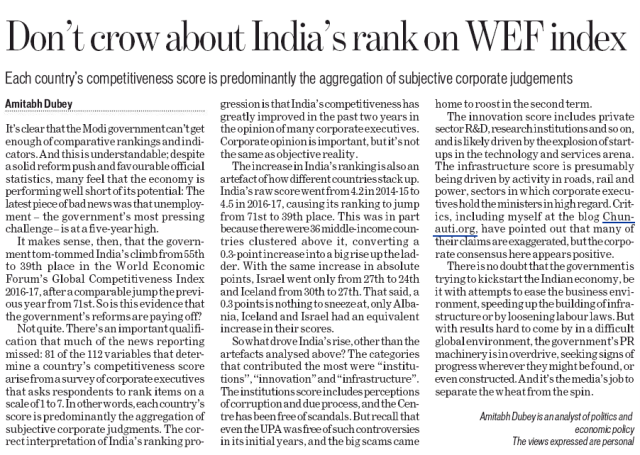A look at India’s rapid rise in the World Economic Forum’s Global Competitiveness Index, first published as an oped in the Hindustan Times:

It’s clear that the Modi government can’t get enough of comparative rankings and indicators. And this is understandable: despite a solid reform push and favourable (if controversial) official statistics, many feel that the economy is performing well short of its potential. The latest piece of bad news was that unemployment – the Modi government’s most pressing challenge – is at a five-year high.
It makes sense, then, that the government tom-tommed India’s climb from 55th to 39th place in the World Economic Forum’s Global Competitiveness Index 2016-17, after a comparable jump the previous year from 71st. So is this finally evidence that the government’s reforms are paying off?
Not quite. There’s an important qualification that much of the news reporting missed: 81 of the 112 variables that determine a country’s competitiveness score arise from a survey of corporate executives that asks respondents to rank items on a scale of 1 to 7. In other words, each country’s score is predominantly the aggregation of subjective corporate judgments. The correct interpretation of India’s ranking progression is that India’s competitiveness has greatly improved in the past two years in the opinion of many corporate executives. Corporate opinion is undoubtedly important, but it’s not the same as objective reality.
The increase in India’ ranking is also an artefact of how different countries stack up. India’s raw score went from 4.2 in 2014-15 to 4.5 in 2016-17, causing its ranking to jump from 71st to 39th place. This was in part because there were 36 middle-income countries clustered above it, converting a 0.3-point increase into a big rise up the ladder. With the same increase in absolute points, Israel went only from 27th to 24th and Iceland from 30th to 27th. That said, 0.3 points is nothing to sneeze at, only Albania, Iceland and Israel had an equivalent increase in their scores.
So what drove India’s rise, other than the artefacts analysed above? The categories that contributed the most were “institutions”, “innovation” and “infrastructure”. The institutions score includes perceptions of corruption and due process, and the BJP government – at least at the Centre – has been free of scandals. But recall that even the UPA was substantially free of such controversies in its initial years, and the big scams came home to roost in the second term.
The innovation score includes private sector R&D, research institutions and so on, and is likely driven by the explosion of startups in the technology and services arena. The infrastructure score is presumably being driven by activity in roads, rail and power, sectors in which corporate executives hold the ministers in high regard. Critics, including myself at the blog Chunauti.org, have pointed out that many of their claims are exaggerated, but the corporate consensus here appears positive.
There is no doubt that the government is trying to kickstart the Indian economy, be it with attempts to ease the business environment, speeding up the building of infrastructure or by loosening labour laws. But with results hard to come by in a difficult global environment, the government’s PR machinery is in overdrive, seeking signs of progress wherever they might be found, or even constructed. And it’s the media’s job to separate the wheat from the spin.

Par for the course, i must say. at this point, i am not sure why you are surprised by such things at all.
media has decided to pick their side and stick with it, for good reason, i suppose.
given the history, i am sure they would rather mint money or be alive than choose the other unsavoury options.
moodys non-change in status gave a chance to utter some ‘interesting’ comments by the powers-that-be.
why are there any sceptics left at all? do they not want ‘acche-din’ in their life?
i am eagerly awaiting the future. smart cities, that is where all the fun is.